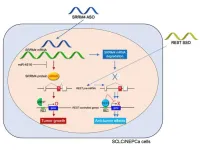(Press-News.org) Behavioral interventions are strategies designed to help people change their behaviors in a way that is positive for themselves and the community. These behaviors can relate to various topics, such as health, citizenship, ecology, and more. Interventions can be applied individually, like someone seeing a psychologist to quit smoking, or collectively, such as NGOs and public institutions investing in anti-smoking campaigns or raising awareness about the dangers of drunk driving.
Understanding how to adapt behavioral interventions to different cultures is essential for the success of health and wellness programs worldwide. A recent study conducted by the D’Or Institute for Research and Education (IDOR) and universities in four other countries highlights the importance of cultural adaptation in behavioral interventions aimed at the population. Published in the Clinical Psychology Review, the study provides valuable guidelines on incorporating cultural psychology into the design and implementation of behavioral interventions.
The Role of Behavioral Interventions in Society
Since the second half of the 20th century, there has been growing awareness of the consequences of human habits and behaviors on public health, the environment, and even the economy of nations. While many studies aim to mitigate these consequences, one of the most effective ways to manage these scenarios is by investing in behavioral interventions that trigger structural changes to prevent undesirable outcomes.
Despite the potential of behavioral psychology to offer effective solutions, implementing interventions focused on changing public habits and mindsets is extremely challenging. This is especially true when considering cultural nuances in different countries, economic conditions, and age groups. Considering these factors, the researchers aimed to identify facilitators for adapting behavioral interventions based on cultural psychology.
Cultural Interventions in Scientific Literature
To conduct the research, scientists evaluated 627 scientific articles related to the cultural adaptation of behavioral interventions, including 25 quantitative reviews or meta-analyses with statistical analyses of cultural adaptations over the past decade.
The main focus areas of these reviews were mental health or psychopathology, parental interventions, substance use, and HIV prevention. Scientists explain that culture can be defined as information or meaning shared within a community and passed down from generation to generation, encompassing psychologically relevant elements such as beliefs, attitudes, norms, and values.
According to the authors, cultural adaptation can lead to more effective, safer, and potentially more economical interventions. However, there is a lack of knowledge about the specific steps and processes required to adapt an intervention to culturally distinct locations.
IDOR psychologist and researcher Dr. Ronald Fischer emphasizes that most of these interventions are developed in the USA, Europe, and Australia. When applied elsewhere without considering cultural and social contexts, the efficacy of the intervention can be compromised, and it can even cause harm due to incompatibility. "It's essential to think about how to best adapt each intervention for each new context," he says.
Key to Success: Community Engagement
Community engagement throughout the entire adaptation cycle of interventions has proven to be key to success. Both theoretically and in practice, the implementation, effectiveness, and sustainability of interventions only persisted beyond the initial research phases when there was complete community collaboration. According to the authors, one way to achieve this community inclusion is to include representatives of the target group involved in all stages of intervention design, as well as in its implementation and follow-up.
Cultural Interventions in Mental Health
As observed, the most explored topics in the mentioned studies reveal that the health sector is the most likely to be targeted by behavioral interventions. Fischer, who is also the lead author of the published study, recently led another project focused on behavioral interventions in health.
Leading the creation of an online and free self-knowledge platform called Jornada de Autoconhecimento (Self-Knowledge Journey), the researcher explains that the initiative aims to offer personalized mental health information based on questionnaires that encourage individuals to learn more about themselves and their mental health tendencies.
"A great need marks the Brazilian context for professional help to address mental health issues. At the same time, many people don't know if the problems they are facing are more manageable or require specialized help. That's why we provide information, videos with activities that can be safely done at home, and self-assessment options with personalized feedback for free on the website. All information, tests, and activities show scientific evidence and have been rigorously adapted to better meet the demands of Brazilians. In this way, we aim to offer quality service and information to help Brazilians deal with mental health and mood issues," explains the scientist.
In addition to contributing to individuals' self-knowledge, an important step for mental health development, the platform also uses data consented by the Brazilian population to base new studies that are personalized and adapted to local culture and standards.
The project is the second behavioral intervention platform for mental health, the first being the IDOR Mental Health Portal, a free page with various videos planned and presented by IDOR health professionals, aimed at teaching the population scientifically proven techniques to help control symptoms of anxiety and depression.
END
Cultural adaptation of behavioral interventions in health promises more effective results for the population
Community involvement is key to developing projects focused on improving quality of life through changes in habits and mentalities of social groups
2024-07-03
ELSE PRESS RELEASES FROM THIS DATE:
New class of cancer mutations discovered in so-called ‘junk’ DNA
2024-07-03
New class of cancer mutations discovered in so-called ‘junk’ DNA
Using artificial intelligence, Garvan Institute researchers have found potential cancer drivers hidden in so-called ‘junk’ regions of DNA, opening up possibilities for a new approach to diagnosis and treatment.
Non-coding DNA – the 98% of our genome that doesn’t contain instructions for making proteins – could hold the key to a new approach for diagnosing and treating cancers, according to a new study from the Garvan Institute of Medical Research. The findings, ...
High ceilings linked to poorer exam results for uni students
2024-07-03
Ever wondered why you performed worse than expected in that final university exam that you sat in a cavernous gymnasium or massive hall, despite countless hours, days and weeks of study? Now you have a genuine reason – high ceilings.
New research from the University of South Australia and Deakin University has revealed a link between rooms with high ceilings and poorer examination results.
A study published in the Journal of Environmental Psychology, led by architecture and psychology-trained UniSA researcher Dr Isabella Bower in collaboration with educational psychology researcher Associate Professor Jaclyn Broadbent from Deakin University, demonstrates that building design impacts ...
Low-dose aspirin could help prevent pregnancy complications caused by flu infections
2024-07-03
A world-first study has found low-dose aspirin may treat flu-induced blood vessel inflammation, creating better blood flow to the placenta during pregnancy.
Animal studies examined whether the treatment for preeclampsia could be applied to flu infections – and the results, according to the research team, were very promising.
Lead researcher and RMIT Post-Doctoral Research Fellow, Dr Stella Liong, said flu infections during pregnancy can resemble preeclampsia, a pregnancy complication that causes inflammation to the aorta and blood vessels.
Low-dose aspirin is commonly taken to prevent preeclampsia, as it stops the body from creating chemicals that cause ...
Splicing it all together in the fight against cancer
2024-07-03
Osaka, Japan – Neuroendocrine tumors, including small cell lung cancer and neuroendocrine prostate cancer, are very aggressive with high chances of spreading. However, many individuals develop resistance to few available treatment options, leading to poor patient outcomes. Researchers are therefore aiming to develop new therapeutic methods that focus on the disease-specific molecular mechanisms of these tumors.
In a recent article published in Molecular Therapy: Nucleic Acids, a team of researchers at Osaka University describe a strategy targeting one such mechanism, called RNA splicing.
RNA splicing is the process ...
World’s first research journal dedicated to psychology and artificial intelligence announced
2024-07-03
Taylor & Francis has announced the launch of the Journal of Psychology and AI, an open access journal that aims to foster dialogue between technologists developing artificial intelligence (AI) systems and psychology researchers exploring human behavior, cognitions, and emotions.
As AI technology becomes increasingly integrated into our lives, the new journal will publish reports on direct human interaction with AI as well as exploring how it is influencing the way we interact with and think about the world.
Other research areas relevant to psychology and AI include using AI for the ...
Zayed to lead new Division of Surgical Sciences
2024-07-03
Mohamed A. Zayed, MD, PhD, a vascular surgeon known for his pioneering research in vascular diseases, has been appointed director of the newly established Division of Surgical Sciences in the Department of Surgery at Washington University School of Medicine in St. Louis. He will assume his new role July 1.
Zayed, a professor of surgery, of radiology, of molecular cell biology, and of biomedical engineering, has more than 25 years of experience leading multifaceted research programs in biotech, medical startups ...
How dust pollution from shrinking Great Salt Lake affects communities disproportionately
2024-07-03
New research from the University of Utah demonstrates how wind-carried dust from the exposed bed of Great Salt Lake is disproportionately affecting disadvantaged communities in the Salt Lake metro area.
The findings suggest restoring the lake to a healthy water level would reduce disparities in harmful dust exposure experienced by different racial/ethnic and socioeconomic groups, along with delivering other ecological and economic benefits.
Exposure to particulate pollution arising from dry portions of the playa is highest among Pacific Islanders and Hispanics and lowest among white people compared to other racial/ethnic ...
Clever clothes! Seams in clothing capture body movement
2024-07-03
Everyday clothing may soon be able to capture and record body movements according to new research published by the Universities of Bristol and Bath.
Harmless low voltages are passed through conductive threads which are stitched into garment seams to create electrical circuits. Their resistance changes with the movement of the wearer's body. The work opens up new possibilities to make digital clothing which senses and captures movements much more accurately than is possible using current phones and smart watches.
The paper, presented at the Designing Interactive Systems (DIS) conference in Copenhagen ...
AMS science preview: Maui wildfire, Salt Lake drying, traffic and weather
2024-07-02
The American Meteorological Society continuously publishes research on climate, weather, and water in its 12 journals. Many of these articles are available for early online access–they are peer-reviewed, but not yet in their final published form.
Below is a selection of articles published early online recently. Some articles are open-access; to view others, members of the media can contact kpflaumer@ametsoc.org for press login credentials.
JOURNAL ARTICLES
Understanding Observed Precipitation Change and the New Climate Normal from the Perspective of Daily Weather Types in the Southeast U.S.
Journal of ...
Research spotlight: Identifying genes to prolong an anti-tumor immune response
2024-07-02
How would you summarize your study for a lay audience?
We set out to identify genes that are commonly expressed in CD8+ T cells, killer immune cells that can drive anti-tumor immunity, across many types of human cancers. Our goal was to uncover new therapeutic targets, which could inform novel treatment strategies that could benefit many patients. To do this, we developed a novel mathematical method that can be applied to data from many types of cancers.
What knowledge gaps does your study help to fill?
We know the presence fof CD8+ T cells is essential for ...
LAST 30 PRESS RELEASES:
New knowledge on heritability paves the way for better treatment of people with chronic inflammatory bowel disease
Under the Lens: Microbiologists Nicola Holden and Gil Domingue weigh in on the raw milk debate
Science reveals why you can’t resist a snack – even when you’re full
Kidney cancer study finds belzutifan plus pembrolizumab post-surgery helps patients at high risk for relapse stay cancer-free longer
Alkali cation effects in electrochemical carbon dioxide reduction
Test platforms for charging wireless cars now fit on a bench
$3 million NIH grant funds national study of Medicare Advantage’s benefit expansion into social supports
Amplified Sciences achieves CAP accreditation for cutting-edge diagnostic lab
Fred Hutch announces 12 recipients of the annual Harold M. Weintraub Graduate Student Award
Native forest litter helps rebuild soil life in post-mining landscapes
Mountain soils in arid regions may emit more greenhouse gas as climate shifts, new study finds
Pairing biochar with other soil amendments could unlock stronger gains in soil health
Why do we get a skip in our step when we’re happy? Thank dopamine
UC Irvine scientists uncover cellular mechanism behind muscle repair
Platform to map living brain noninvasively takes next big step
Stress-testing the Cascadia Subduction Zone reveals variability that could impact how earthquakes spread
We may be underestimating the true carbon cost of northern wildfires
Blood test predicts which bladder cancer patients may safely skip surgery
Kennesaw State's Vijay Anand honored as National Academy of Inventors Senior Member
Recovery from whaling reveals the role of age in Humpback reproduction
Can the canny tick help prevent disease like MS and cancer?
Newcomer children show lower rates of emergency department use for non‑urgent conditions, study finds
Cognitive and neuropsychiatric function in former American football players
From trash to climate tech: rubber gloves find new life as carbon capturers materials
A step towards needed treatments for hantaviruses in new molecular map
Boys are more motivated, while girls are more compassionate?
Study identifies opposing roles for IL6 and IL6R in long-term mortality
AI accurately spots medical disorder from privacy-conscious hand images
Transient Pauli blocking for broadband ultrafast optical switching
Political polarization can spur CO2 emissions, stymie climate action
[Press-News.org] Cultural adaptation of behavioral interventions in health promises more effective results for the populationCommunity involvement is key to developing projects focused on improving quality of life through changes in habits and mentalities of social groups





